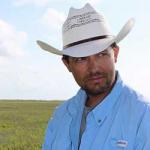
Jeffrey Wozniak, Ph.D.
Dr. Jeffrey Wozniak (He, His, Him), an aquatic ecosystem ecologist, is currently studying the coastal wetlands in and around the Aransas National Wildlife Refuge along the Texas Gulf Coast to assess how these complex coastal ecosystems are responding to a wide range of natural and anthropocentric influences and the resulting impacts on the endangered whooping crane.
What makes whooping cranes an interesting species to study?
To start, whooping cranes are majestic. When you’re out on the marsh and you see one they are so large compared to any other birds out there. With their bright white plumage, they stand out like a sore thumb against the green/brown marsh landscape. Despite their large size, they move around the marsh with great grandeur. This population of whooping cranes is the last naturally migratory population in the world. Each year these ~500 birds make a ~2,500-mile migration from northern Canada to this specific coastal habitat. What we are trying to do is determine what makes this specific coastal habitat special for the cranes. Moreover, we need to understand what we can do to maintain the system as well as identify similar coastal habitats so this population can continue to expand.
When you have the opportunity to be on the water for several days at a time, you get to know individual birds and different families that occupy a specific coastal territory. Then when you personally get out on the marsh and get to conduct research in that territory, you gain a great appreciation for the different food resources available to the cranes and the overall complexity of this unique coastal ecosystem. It’s powerful and really reiterates why we are doing this research and its overall importance to coastal ecology.
What is your favorite moment in the field?
My favorite moment is probably that first morning when you are in the field. You wake up early and hit the water somewhere around sunrise, you hear the boat motor turn on, you smell the sea breeze you see the dolphins in the inter-coastal waterway and you look out across the marsh and you think, "Okay, I can do this for a living – this isn’t such a bad office.” That’s usually a pretty memorable moment, one that definitely puts a smile on your face!
Education
- Ph.D. Florida International University, Department of Biological Sciences, FL (U.S.)
- B.S. Allegheny College, Department of Biology, PA (U.S.)
